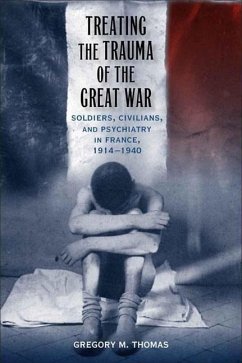From the outset of World War I, French doctors faced an apparent epidemic of puzzling neurological and psychiatric illnesses among soldiers. As they attempted to understand the causes of these illnesses, doctors organized specialized centers near the front, where they submitted soldiers to swift, humiliating treatments and then returned them to duty. At home, they interned the scores of civilians who succumbed to the wars strains in decrepit asylums or left them to fend for themselves. In Treating the Trauma of the Great War, Gregory M. Thomas explores the psychological effects of the war on French soldiers and citizens. Doctors vigorously debated the wars role in the neuropsychiatric disturbances observed in soldiers and others, but most psychiatrists concluded that the illnesses appeared primarily in individuals predisposed to disease. Consequently, doctors granted their patients few favors when making decisions about diagnostic labels, treatment regimes, and pension allocations, leaving many to endure illnesses without adequate care or sufficient financial support. In their quest to understand the psychological impact of war, Thomas argues, doctors focused more on demonstrating the capabilities of their medical specialties and serving a state at war than on treating patients. Thomas draws on the vast medical literature produced during and after the war, including veterans journals, parliamentary debates, newspaper articles, and medical administrative reports, infusing his narrative with a vivid human element. Though psychiatrists ultimately failed to raise the status of their specialty, Thomas reveals how the war helped precipitate lasting changes in psychiatric practice.








